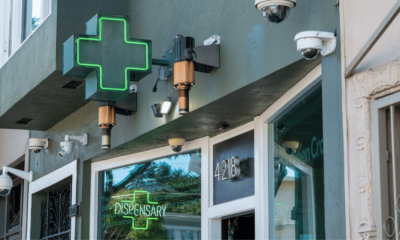A four-year experiment to try and solve the Netherland’s ‘backdoor’ cannabis criminality problem could see patients turning to coffee shops for easier access.
The cultivation and sale of cannabis for recreational purposes are strictly prohibited in the Netherlands – unless you are visiting one of the country’s famous coffee shops.
These establishments are allowed to sell small amounts of cannabis but operate under strict rules, including a limited stock of 500 grams.
On a municipal level, authorities can decide how many coffeeshops it will allow if any, and as the country deals with a growing number of “drug tourists”, individual municipalities can choose to ban foreign visitors from entering the region’s coffee shops.

Although the sale of the drug is tolerated, coffee shops face a contradiction in Dutch law known as the ‘backdoor policy’. Shops can sell the drug to their customers, but their suppliers are forbidden from cultivating and selling cannabis to them. In other words, sales through the front door are allowed, while sales through the backdoor are not.
“As a result of the policy of tolerance, the sale of cannabis to users is permitted, but the cultivation, sale and purchase of that cannabis is prohibited, which easily leads to crime. After all, the coffee shop needs to be supplied,” said Ellen Gielen, head of the life sciences group at global law firm, CMS and co-author of the company’s ‘Expert Guide on Cannabis Legislation’.
“The discussion to legalise the supply of coffee shops with cannabis has been going on for several years.”
A 2008 “weed summit” brought together 33 Dutch mayors from various municipalities and different political parties to discuss drug tourism in border regions. A survey carried out by the evening newspaper NRC Handelsblad revealed that 80 percent of the mayors in attendance were in favour of ‘regulating the backdoor’.
Over a decade later, the Netherlands is now embarking on an experiment across ten municipalities to evaluate the effects of a closed supply chain for coffeeshops.
Ten commercial cultivators will be made exempt from current laws, allowing them to sell and deliver quality-controlled cannabis to a total of 79 coffee shops.
The experiment is known as the ‘controlled cannabis supply chain experiment’.
The legally produced cannabis will have to be lab-tested and meet the Dutch government’s quality, labelling and packaging requirements. But there will be no limit to the THC concentration and producers can set their own pricing.
Cultivators applied to be part of the study in July 2020 and are due to be selected this month before the Dutch government kick starts the four-year experiment.
“The aim is to see if and how cultivators can supply quality-controlled cannabis to coffee shops in a decriminalised way,” Gielen added.
“In addition, the government wants to examine the effects of the experiment on the problems that some municipalities experience – for instance, on crime and public health.
“The experiment means that more suppliers and cultivators are contracted by the government and there are more options for the sale of seeds and or cannabis.”
Gielen anticipates that recreational use through coffee shops will, in part, substitute medicinally prescribed cannabis.
“Doctors are holding back from prescribing cannabis and health insurance companies, in general, do not reimburse for medicinal cannabis,” Gielen said.
“Some patients therefore choose to get their cannabis at coffee shops.”
Although it has been legal for any physician to prescribe medical cannabis in the Netherlands since 2003, treatment guidelines do not encourage prescribing due to the lack of clinical evidence.
“Especially now that the government is planning to supervise the supply and quality through the experiment, expectations are that medicinal users will switch to the freely available recreational cannabis, as they have to pay for it anyway.”
A research consortium that includes Breuer & Intraval, Rand Europe and the Trimbos Institute was commissioned by the Dutch government and will carry out an evaluation over the four-year period.
The consortium will investigate the impact of the experiment on health, user experience, nuisance and displacement effects.

Stijn Hoorens, senior research leader at RAND Europe
“We will conduct numerous interviews with coffeeshop owners, municipalities, police and other stakeholders,” said Stijn Hoorens, senior research leader at Rand Europe.
“We will count coffeeshop visitors and conduct a survey amongst customers and ask them about their purchasing and consumption behaviour.”
The Trimbos Institute, meanwhile, will take cannabis samples from coffeeshops in both experimental and control cities and have them lab-tested and compared.
“At RAND, we will also aim to measure some of the developments outside the coffeeshops and whether we could observe any displaced effects on the illegal market,” Hoorens continued.
“This is very difficult, because we don’t have a reliable picture of what’s happening in the illegal market in the first place, let alone as a consequence of the experiment, but we’ll try.”
The results from the ten multiplicities involved with the experiment will be compared with a control group of ten other regions where the current laws are maintained.
The conclusions of the study will later be used by the government to decide on its next steps for designing the future of cannabis policy, however Hoorens said the main objective was not to reduce illegal production or curb organised crime.
“The primary objective is to test whether it is at all possible, or feasible to design, operate and enforce a closed supply chain for decriminalised cannabis,” Hoorens said.
“If the main actors in the supply chain, producers, distributors, coffee shops, consumers, local authorities and law enforcement are happy, the experiment has succeeded. However, we are also asked to attempt to measure the effects on public health, public safety, nuisance, crime, and displacements effects.”
At such an early stage, it is difficult to predict the outcome of the experiment, but Hoorens believes it is unlikely that the “backdoor” policy will still exist in the Netherlands after the four-year experiment.
“We have a number of hypotheses that we will test, but anything could happen,” Hoorens added.
“If customers don’t like the legally produced cannabis, the illegal market might thrive. If the legal products turn out to be a success, there might be a displacement from the illegal market, and perhaps even from other cities towards the coffee shops in intervention cities.
“I think it’s fair to say, that it is unlikely that the situation with a decriminalised front door and a criminalised back door will still be present in the Netherlands.”

 News6 months ago
News6 months ago
 Science5 months ago
Science5 months ago
 Industry6 months ago
Industry6 months ago
 News6 months ago
News6 months ago
 News5 months ago
News5 months ago
 Health5 months ago
Health5 months ago
 News5 months ago
News5 months ago
 Health3 months ago
Health3 months ago














